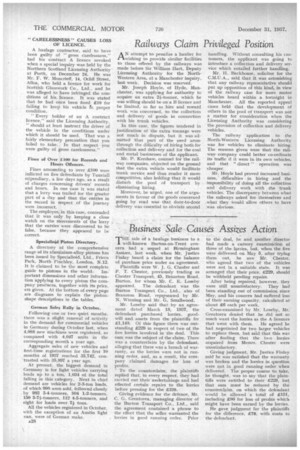Business Sale Causes Assizes Action T HE sale of a haulage
Page 8

If you've noticed an error in this article please click here to report it so we can fix it.
business to a well-known Horton-on-Trent concern had a sequel at Birmingham Assizes, last week, when Mr. Justice Finlay heard a claim for the balance of purchase price under an agreement.
Plaintiffs were W. J. G. Chester and P. T. Chester, previously trading as Chester Transport, 45, Branston Road, Burton, for whom Mr. C. E. Loseby appeared. The defendant was the Burton Transport Cu., Ltd., also of 13ranston Road, represented by Mr. N. Winning and Mr. G. Smallwood.
Mr. Loseby said that by an agreement dated March 18, 1937, the defendant purchased lorries, goodwill and assets from the plaintiffs for £1,148. Of this figure there was outstanding £229 in respect of two of the Eve lorries involved in the deal. This sum was the subject of the claim. There was a counterclaim by the defendant, alleging that there was a breach of warranty, as the lorries were not in running order, and, as a result, the company claimed damages for loss of profits.
' To the counterclaim, the plaintiffs replied that, in every respect, they had carried out their undertakings and had effected certain repairs to the lorries before pressing for the £229.
Giving evidence for the defence, Mr. C. G. Greatorex, managing director of the Burton Transport Co., Ltd., said the agreement contained a phrase to the effect that the seller warranted the lorries in good running order. Prior to the deal, he and, another director had made a cursory examination of three of the lorries, but, when the five were delivered on May 5, after trying them out, he saw Mr. Chester, who agreed that two of the vehicles were not in a suitable state. It was arranged that their price, £229, should be withheld pending repairs.
After being repaired, however, they were still unsatisfactory. They had been standing out of commission since May, and his concern had suffered loss of their earning capacity, calculated at about £6 each per week.
Cross-examined by Mr. Loseby, Mr. Greatorex denied that he did not so much want the lorries as the A licences that went with them. He agreed he had negotiated for two larger vehicles to replace them, but said that this was after finding that the two lorries acquired from Messrs. Chester were unsatisfactory.
Giving judgment, Mr. Justice Finlay said he v,:as satisfied that the warranty was broken and the lorries in question were not, in good running order when delivered. The proper course to take, he thought, was to say that the plaintiffs were entitled to their £220, but that sum must be reduced by the counterclaim, on which the defendant would be allowed a total of £151, including £80 for loss of profits which might have been earned by the lorries.
He gave judgment for the plaintiffs for the difference, £78, with costs to the defendant.
































